The significance of SEO tools is well known since they make the life of an analyst comfortable. How can you uncover hidden opportunities with keyword research tools? What strategies can you use to track progress and refine your efforts with analytics platforms? These questions may be endless. The only reality is that there is always a starting point!
So let’s work together and learn the SEO magic you can do with these tools. What is the best way to outsmart your competitors or monitor your site like a specialist? We are your support. Your ability to benefit from organic traffic and your project’s sustainability depends on mastering them.
Let us begin with understanding the basics first.
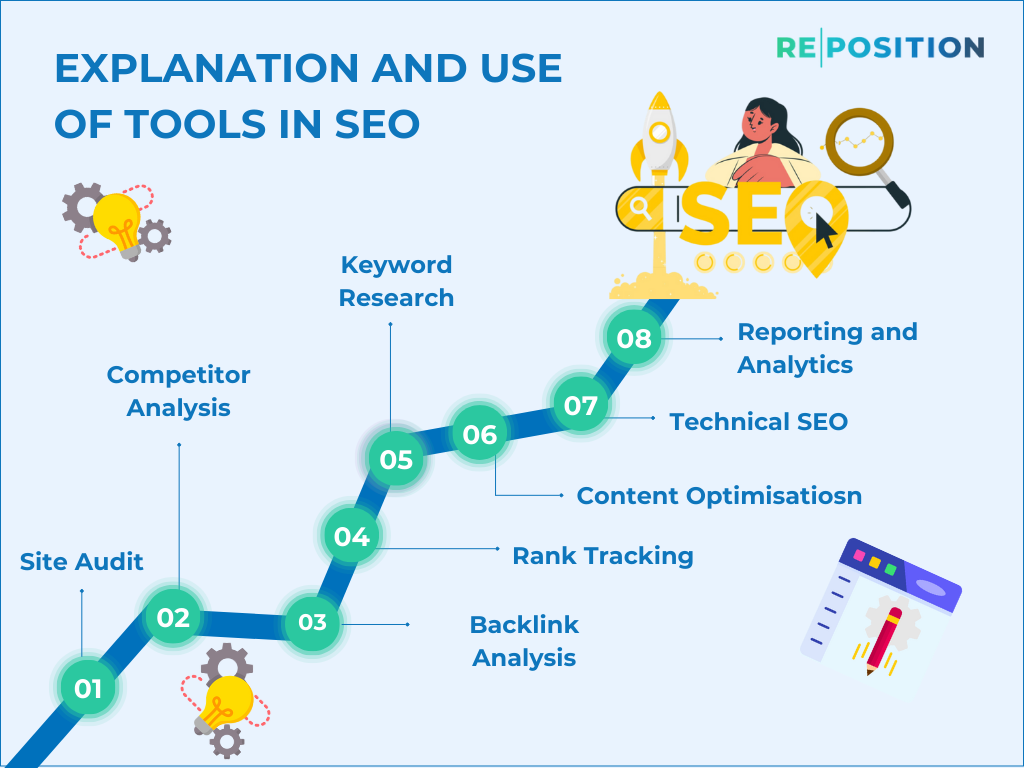
Explanation and Use of Tools in SEO
When it comes to SEO (Search Engine Optimisation), tools are like your digital sidekicks—they’re essential for boosting your website’s performance and hitting your marketing targets online. These tools do everything from checking how well your site is doing to tweaking it for better results.
Let us help you understand how these tools can help you nail your SEO strategy.
Check Website Health: One of the fundamental tasks of SEO tools is to assess and monitor the health of a website. Web Master tools and Open Site Explorer provide insights into crucial metrics such as site speed, mobile responsiveness, and overall site structure. Conducting regular website health checks ensures that your site meets the technical standards set by search engines, thereby improving its chances of ranking well in search results.
Domain Authority Check: Understanding your website’s Domain Authority (DA) is essential for assessing its credibility and potential to rank higher in search engine results pages (SERPs). Tools like Domain Authority Checker and DR Checker provide a numerical score that predicts a website’s ability to rank based on its backlink profile and overall authority.
Free Website Checker Tools: Many SEO tools offer free versions or trial periods, allowing users to assess their features and functionality before committing to a purchase. These free check website tools often provide limited access to essential metrics but serve as an excellent starting point for businesses looking to optimise their online presence without initial investment.
Identifying Key Phrases: Identifying the right key phrases and marketing keywords is crucial for targeting specific audiences and optimising content for search engines. Keyword Explorer and search term tools when used together can help analyse search trends and suggest relevant keywords that can drive organic traffic to your website.
Checking Page Authority: Similar to Domain Authority, Page Authority (PA) focuses on the strength of individual pages within a website. Tools that offer Page Authority Checker capabilities help SEO professionals gauge the SEO strength of each page and identify opportunities for improvement.
Site Explorer: A Site Explorer tool allows users to delve deep into a website’s structure and content hierarchy. It provides insights into internal linking, page depth, and overall indexing status, which are critical for optimising site architecture and improving user navigation.
Website Score: SEO tools often assign a numerical website score based on various factors such as speed, mobile-friendliness, and content quality. This score serves as a benchmark for measuring improvements over time and prioritising SEO efforts.
Understanding the role of a search provider is fundamental in SEO. So, what is a search provider? All of us are well aware of Google right? These providers dictate search algorithms and indexing processes, influencing how websites are ranked in search results.
SEO tools that track Google algorithm updates are invaluable for staying informed of changes that may impact website visibility and ranking positions.
By using these tools effectively, businesses can gain actionable insights, optimise their websites for better performance, and stay competitive. Each tool plays a crucial role in enhancing SEO strategies and achieving long-term online success.
How Tools Play an Important Role in SEO?

Building on the foundational understanding of SEO tools, it becomes evident that these instruments are not merely supplementary but integral to every aspect of a successful SEO strategy. Here’s a detailed exploration of how these tools play a key role in optimising website performance.
Essential SEO Tools and Their Role in Website Optimisation
SEO tools are crucial in identifying the best SEO for website practices suited to your specific needs, improving visibility, and attracting organic traffic. Before optimising a website, one surely needs to understand where the website ranks.
By using the best SEO rank tracker tools, you can monitor your website’s SEO ranking across search engines, providing real-time data on keyword positions and allowing you to measure progress and adjust strategies accordingly.
When selecting the SEO website tools, it’s essential to choose platforms that align with your business goals, offering comprehensive features for keyword research, competitor analysis, and performance tracking.
Regularly check the SEO of your site using specialised tools to identify areas for improvement in site structure, content quality, and technical SEO factors, ensuring your website meets current SEO standards and remains optimised for search engine algorithms.
Tools that help you find the SEO ranking of the website enable you to monitor keyword positions and track fluctuations in search engine results pages (SERPs). This data is crucial for understanding your website’s visibility and competitiveness within your industry.
Many free SEO tools offer basic functionalities that provide valuable insights into keyword trends, site health, and backlink profiles, serving as entry points for businesses looking to optimise their digital marketing efforts without initial financial investment.
Their Role in Optimising Local Search Performance
Implementing effective local SEO strategies is crucial for businesses aiming to attract and retain local customers.
A successful local SEO depends on tools from good SEO sites. The role of SEO tools offering comprehensive solutions for local search optimisation becomes important here. But how does this happen? Say, for instance, we are well aware of how important a location is for local rankings.
These sites provide tools to enhance your local SEO ranking by focusing on location-specific keywords and content customised to your target audience.
Understanding local SEO ranking factors is vital for improving your visibility in local search results. Factors such as the consistency of your business’s name, address, and phone number (NAP) across all online platforms, customer reviews, and local backlinks significantly impact your ranking.
There are SEO tools that can help you keep a check on these factors to help your website perform better.
Regular monitoring of SEO efforts ensures that your strategies are effective and up-to-date. Tools like on-page SEO checkers and on-page SEO optimisation tools help you analyse and improve your website’s content, ensuring it aligns with local SEO best practices. By using these tools, you can identify and fix on-page issues, such as missing meta tags or keyword stuffing, that might be affecting your local rankings.
The Role of Analysis Tools on Advanced SEO Ranking
To improve your website’s performance, using on-page SEO tools is essential. These tools help refine elements such as title tags, meta descriptions, headers, and content to ensure they align with your target keywords and local search intent. On-page SEO checkers for websites offer valuable insights to enhance your site’s on-page elements effectively.
Additionally, on-page SEO optimisation tools provide recommendations to further improve your site’s performance.
A rank tracker SEO tool monitors keyword positions across search engines, providing insights into keyword performance trends and competitor rankings. Generating ranking reports SEO helps visualise keyword performance and track improvements over time, informing strategic decisions to optimise content and enhance search engine rankings.
Conducting regular ranking SEO checks ensures that your website meets search engine criteria for optimal performance and visibility.
Tools Playing a Role in Comprehensive SEO Research and Analytics
Continuous research in SEO using tools and resources helps stay ahead of algorithm updates, industry trends, and emerging technologies. This research informs strategic decisions and ensures your SEO efforts remain effective and competitive.
Tools equipped with SEO analytics and reporting capabilities provide comprehensive insights into website performance, traffic sources, and user behaviour. These insights guide data-driven decisions to improve SEO strategies and achieve marketing goals. Integrating SEO and analytics tools enables comprehensive data analysis to measure the impact of SEO efforts on website performance and business outcomes.
Continuous SEO monitoring ensures that your website maintains optimal visibility and performance in search engine results. Monitoring tools track keyword rankings, backlink profiles, and site health metrics to identify areas for improvement.
An SEO checker tool assesses the best websites for SEO best practices, technical issues, and performance metrics, providing actionable insights to optimise website visibility and search engine rankings.
Analysing SEO data collected from tools helps identify trends, measure performance metrics, and make informed decisions to improve website visibility and search engine rankings.
Optimising SEO Performance With Tools
Implementing SEO for websites involves optimising them for search engine algorithms, improving content relevance, and enhancing user experience factors. Website SEO optimisation involves implementing strategies to improve search engine rankings, attract organic traffic, and enhance online visibility.
Staying informed with SEO industry news and updates helps adapt strategies to algorithm changes, industry trends, and best practices. This knowledge ensures your SEO efforts remain current and effective. Tools that provide SEO measurement capabilities quantify the impact of SEO efforts on website performance, traffic growth, and conversion rates, informing strategic decisions to optimise digital marketing strategies.
Tracking SEO metrics such as keyword rankings, backlink profiles, and organic traffic growth helps measure the effectiveness of SEO strategies and identify opportunities for improvement. Continuous SEO monitoring using dedicated tools ensures that your website maintains optimal performance levels. Monitoring tools track keyword rankings, website traffic, and backlink metrics, providing actionable insights to refine SEO strategies.
Analysing SEO performance metrics helps evaluate the effectiveness of SEO strategies in improving website visibility, attracting organic traffic, and achieving marketing objectives.
Monitoring and Tracking SEO Progress
An SEO rank checker tool monitors keyword positions across search engines, providing insights into keyword performance trends and competitor rankings. Utilising an SEO rank checker tool facilitates monitoring keyword rankings, identifying trends, and evaluating the effectiveness of SEO strategies.
Monitoring SEO rank helps track keyword positions and assess the impact of SEO efforts on search engine visibility and website performance. Tools equipped with SEO rank monitoring capabilities monitor keyword positions across search engines, providing real-time data to optimise SEO strategies and improve website visibility.
Utilising SEO rank tracking software enables continuous monitoring of keyword positions and performance metrics to optimise SEO strategies effectively. An SEO rank tracking tool monitors keyword positions, tracks changes in search engine rankings and provides actionable insights to improve SEO performance.
Achieving SEO ranking involves optimising websites for search engine algorithms, improving content relevance, and enhancing user experience factors. Understanding SEO ranking factors such as content quality, backlink profile, and website structure helps prioritise SEO efforts and improve search engine visibility.
Identifying SEO ranking sites helps benchmark performance against competitors and implement strategies to improve search engine rankings. Continuous SEO research using tools and resources helps stay informed about algorithm updates, industry trends, and best practices. This research informs strategic decisions to optimise SEO strategies effectively.
Measuring SEO results through tools and analytics helps evaluate the impact of SEO efforts on website visibility, traffic growth, and conversion rates. Monitoring SEO search ranking enables businesses to track keyword positions, evaluate competitor performance, and adjust strategies to improve search engine visibility.
Optimising SEO sites involves implementing strategies to improve search engine rankings, attract organic traffic, and enhance user experience. Continuous SEO tracking using dedicated tools helps monitor keyword positions, track website performance, and identify opportunities for SEO improvement.
Staying updated with SEO updates and algorithm changes ensures that your SEO strategies remain effective and compliant with search engine guidelines. Optimising SEO website involves implementing strategies to improve search engine rankings, attract organic traffic, and enhance user experience.
Monitoring SEO competition and tracking their strategies helps identify opportunities for improvement and stay ahead in the competitive market. Implementing website SEO involves optimising site structure, content, and technical aspects to improve search engine rankings and attract organic traffic.
Let us now understand the specific aspects that are crucial for maintaining and improving website performance – SEO audits. An SEO audit is a comprehensive analysis of your website to identify issues that could affect your search engine rankings. Here, we will help you to explore various SEO audit tools and how to effectively use them to enhance your website’s SEO.
Understanding The Role Of SEO Audit Tools
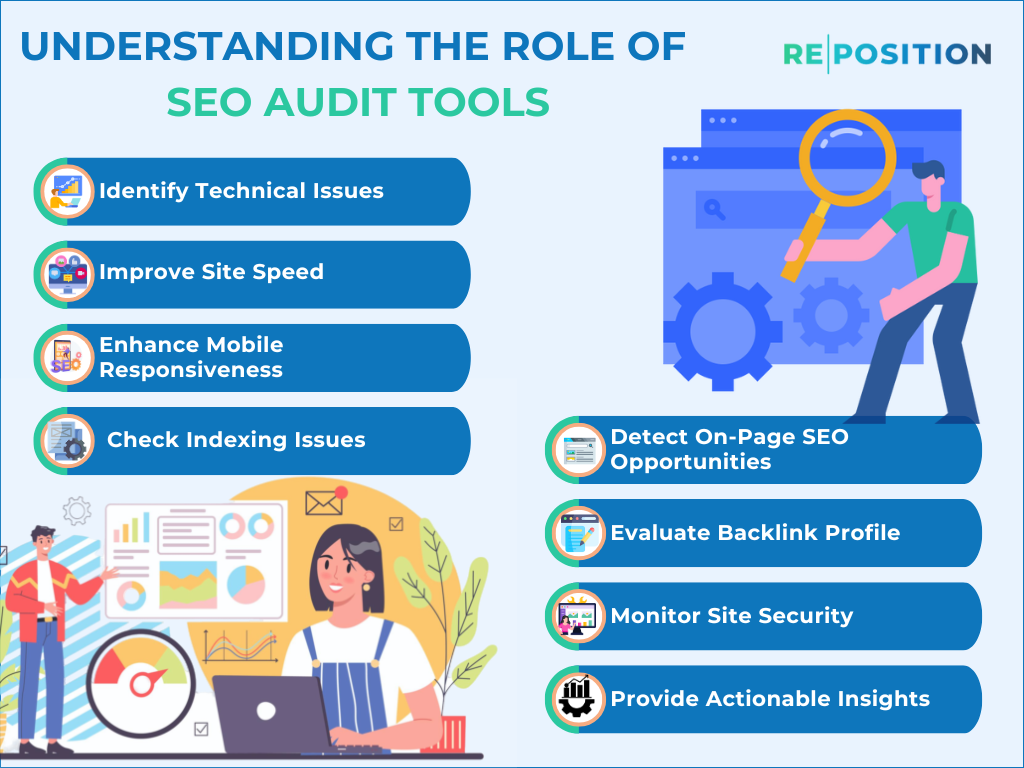
Conducting regular SEO audits is crucial for maintaining a healthy and optimised website. An SEO audit helps identify and fix issues that may be affecting your website’s performance, ensuring it aligns with the latest SEO best practices.
An SEO audit is a comprehensive analysis of your website to evaluate how well it is optimised for search engines. This process involves assessing various factors like site structure, content quality, technical SEO, and backlink profile. The best SEO audit tools provide a detailed overview of your site’s health, identifying issues that could hinder its performance.
Essential SEO Audit Tools and Software
SEO audit tools like Screaming Frog and SEMrush offer robust features for site analysis. These tools help you perform a thorough SEO site audit, covering aspects such as page speed, mobile usability, and internal linking. Free SEO audit tools are available, like Google’s Lighthouse and other browser extensions, which provide valuable insights without any cost. SEO audit software provides automated checks and detailed reports, saving time and ensuring no critical aspect is overlooked.
Conducting a Technical SEO Audit
A technical SEO audit focuses on the technical aspects of your site, such as server performance, URL structure, and crawlability. Tools like Ahrefs and Moz offer specialised features for technical SEO audits. Using a technical SEO audit checklist ensures that all critical technical factors are reviewed and optimised.
On-Page and Off-Page SEO Audits
An on-page SEO audit involves analysing individual web pages to ensure they are optimised for target keywords and user experience. Tools like the on-page SEO checker and on-page SEO audit tools provide detailed analysis and suggestions. An SEO page audit focuses on page-specific elements such as title tags, meta descriptions, and content quality. Conducting an SEO link audit helps evaluate the quality and relevance of backlinks, which are crucial for off-page SEO.
Creating and Using SEO Audit Checklists and Templates
An SEO audit checklist serves as a guide to ensure all important aspects of the site are reviewed during the audit process. Templates, like an SEO audit template or a website audit template, offer a structured format to document findings and recommendations. Website audit checklists help streamline the audit process, ensuring no critical areas are missed.
Generating SEO Audit Reports
An SEO audit report compiles the findings from the audit, providing actionable insights and recommendations for improvement. Tools like SEO website auditors generate comprehensive reports that highlight key issues and suggest fixes.
Web and Site Audits
Conducting a web audit or site audit involves a complete review of the website’s overall performance, usability, and SEO compliance. A web audit tool provides a detailed analysis of various aspects of the website, helping to identify areas for improvement. Using a site audit tool like Sitebulb or DeepCrawl ensures that all technical and content-related aspects are thoroughly examined.
Performing a Website SEO Audit
How to do a website audit with accuracy becomes a question. A website SEO audit assesses the overall SEO health of your site, identifying issues and opportunities for optimisation. Tools like the website audit tool provide automated insights and actionable recommendations to enhance your site’s SEO performance.
By implementing these SEO audit tools and strategies, you can ensure your website remains optimised, competitive, and aligned with the latest SEO best practices. Regular audits help identify potential issues early, allowing you to address them promptly and maintain a strong online presence.
How Are Tools Helpful For Keyword Research
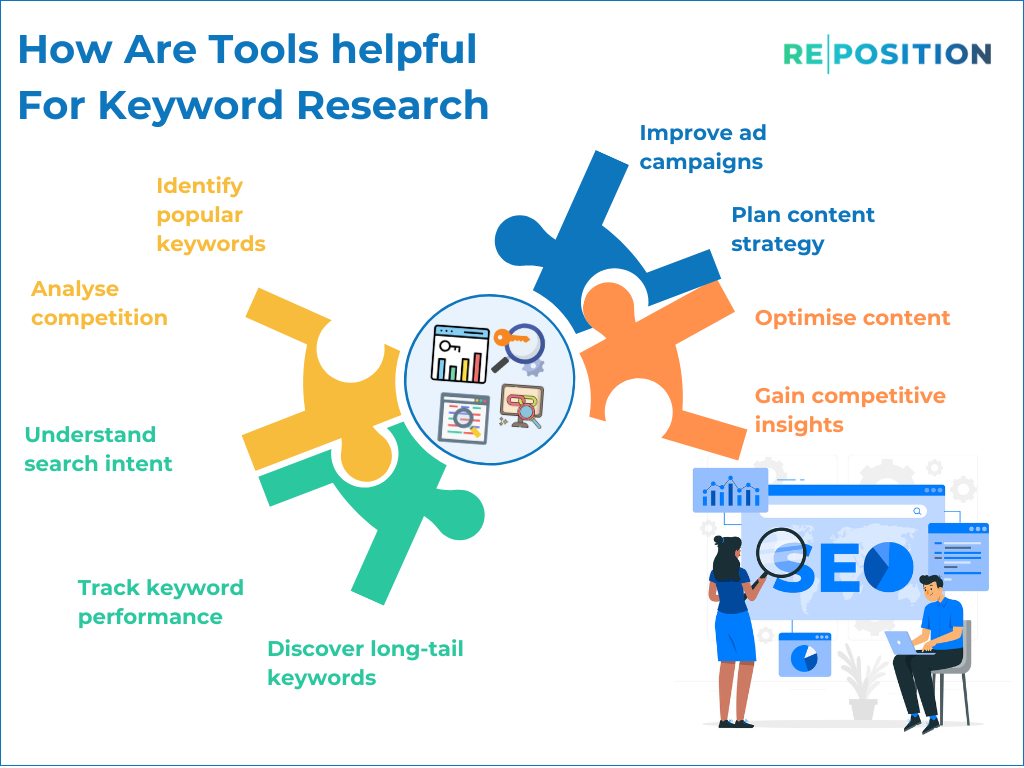
When it comes to optimising your website for search engines, keywords are of great importance. Finding the best keyword ranking tool can significantly impact your SEO strategy. These tools provide insights into how your keywords perform in search engine results, helping you identify opportunities for improvement.
Keyword Research Tools
Utilising the best keyword research tool allows you to explore a wide range of keywords relevant to your industry. Whether you’re targeting broad terms or niche-specific phrases, these tools streamline the process of discovering keywords that connect with your audience.
Moreover, having access to the best keyword tracker and best keyword tracking tool is crucial for monitoring the performance of your chosen keywords over time. These tools enable you to track changes in keyword rankings, assess their effectiveness, and make informed adjustments to your SEO tactics. A free keyword research tool can also be invaluable, especially for those starting with limited resources. It provides basic insights into keyword trends and search volumes, helping you get started on optimising your content.
In planning your SEO strategy, using a keyword generator and keyword planner can provide deeper insights into potential keywords to target. These tools analyse search patterns and suggest relevant keywords based on your input, making them indispensable for strategic planning. For those diving deeper into SEO, a keyword research guide and keyword research in SEO resources offer comprehensive frameworks and methodologies for conducting thorough keyword analysis.
Understanding keyword search on websites and keyword search optimisation techniques further enhances your ability to target the right keywords effectively. These methods involve optimising your website content to align with popular search queries, thereby increasing your visibility on search engine results pages (SERPs).
Similarly, tracking keyword search ranking and keyword search volume helps you gauge the popularity and competitiveness of your keywords, guiding your content creation and optimisation efforts.
A well-defined keyword strategy backed by reliable keyword tracking tools such as multi-keyword rank checkers and multiple keyword rank checkers is essential for maintaining a competitive edge in SEO.
These tools provide real-time data on keyword performance, allowing you to refine your strategy continuously. Exploring ranking for keywords and using top keyword research tools gives you insights into industry trends and competitor strategies, informing your own keyword selection process.
Understanding what is keyword research is fundamental for any digital marketer or website owner aiming to optimise their online presence. By harnessing the power of these keyword tools effectively, you can enhance your website’s visibility, attract more organic traffic, and ultimately achieve your SEO goals.
Keyword Ranking and Tracking Tools
Understanding how your keywords are performing is crucial. To get a clear picture of your website’s visibility, it’s essential to use tools that can check website keyword ranking. These tools help you see where your keywords stand in search engine results, allowing you to make informed decisions about your SEO strategy.
One of the primary tools for this purpose is the keyword rank checker software. This software enables you to find keyword ranks easily, giving you insights into how well your keywords are performing. By using a keyword rank tracker tool, you can monitor changes in your keyword positions over time. This is particularly useful for keeping track of your progress and adjusting your strategies as needed.
Another important tool in your SEO arsenal is the keyword rank tracking software. This software provides detailed reports on your keyword ranking position, showing you which keywords are climbing the ranks and which ones might need more attention. These insights are compiled into a keyword ranking report, which helps you understand the effectiveness of your SEO efforts.
For those who want a more comprehensive view, keyword ranking software offers a broader range of features. It not only tracks your keyword positions but also provides analysis and recommendations. This type of software can help you optimise your content and improve your rankings over time.
Additionally, tools like the SERPs keyword rank checker are designed to focus specifically on search engine results pages (SERPs). This tool gives you a clear picture of where your keywords stand.
When you use these tools, you can maintain a strong understanding of your SEO performance. Regularly checking your keyword rankings helps you stay ahead of the competition and ensures your website continues to attract the right audience.
Whether you’re using keyword rank checker software or a more advanced keyword ranking software, the key is to stay informed and proactive in your SEO strategy.
Keyword Analysis Tools
Keyword analysis tools are essential for anyone looking to enhance their SEO efforts. They help answer questions like “How do I do keyword research using keyword analysis tools?” and provide comprehensive data to guide your SEO strategy.
Understanding “how to do keyword research” is fundamental, and these tools simplify the process by offering insights into keyword performance, competition, and relevance.
One common question is, how do you do a keyword search? Using keyword analysis tools, you can easily find the best keywords to target. These tools show you how to check the keywords of a website, revealing which terms are driving traffic to your competitors’ sites.
Knowing how to choose keywords for search engine optimisation and how to choose keywords for SEO is crucial, and keyword analysis tools make this task straightforward by providing detailed metrics on keyword effectiveness.
When you’re looking to optimise your content, understanding how to determine keywords is vital. Keyword analysis tools can guide you on how to do keyword research for SEO by highlighting the most valuable keywords for your niche.
These tools also show you how to find keywords from a website and how to find keywords on a website, making it easier to identify terms that will improve your search engine rankings.
For those new to SEO, knowing how to look for keywords on a website can be challenging. Keyword analysis tools simplify this process by showing you how to research keywords and providing data on keyword search volumes and trends.
These tools also teach you “how to search a keyword on a website,” helping you uncover hidden opportunities for optimisation.
If you’re wondering how to search for keywords on a website, keyword analysis tools offer user-friendly interfaces that guide you through the process, ensuring you can find the most effective terms to enhance your content.
Performing keyword analysis is a critical step in SEO, and learning how to do keyword analysis can significantly impact your strategy. Keyword analysis software is designed to help you with this task, offering detailed reports and insights that reveal keyword performance and competition.
Understanding keyword ranking analysis is also essential, as it helps you track your progress and make informed decisions about your SEO tactics.
Keyword analysis tools are invaluable for anyone serious about SEO. They answer essential questions like how to do keyword research using keyword analysis tools and how to choose keywords for search engine optimisation, making the complex process of keyword research and analysis much more manageable.
These keyword analysis tools can enhance your SEO efforts, attract more traffic, and achieve better search engine rankings.
Website Keywords and Analysis
Understanding the importance of keywords for your website is essential for effective SEO. To begin, you need to check keywords on the site to ensure they align with your SEO goals. When you check your website keywords, you’re essentially assessing whether your content is optimised to attract the right audience. This process starts with a clear understanding of what keywords are, which involves defining keywords accurately.
A simple definition of keywords is that they are specific words or phrases that describe the content of your website and what users might search for. For instance, an example of a keyword could be “best SEO tools,” which targets users looking for top-rated SEO solutions.
When you find a website’s keywords, you’re identifying the terms that are most relevant to the content on that site.
To find the keywords of a website, you can use various SEO tools designed for this purpose. These tools help you find keywords for a website by analysing the content and providing a list of the most effective terms.
When you find keywords on a website, you’re able to see which words are driving traffic and engagement. This is crucial for optimising your own site, as you can find site keywords that align with your SEO strategy.
One practical method is to get keywords from a website using keyword analysis tools. These tools can identify the keywords for marketing, ensuring that your promotional content targets the right audience.
Knowing the keywords for web content is equally important, as it helps in crafting relevant and engaging articles, blog posts, and other online materials. Always remember that keywords for your website should be strategically chosen to improve visibility and attract the right visitors.
Understanding the keyword’s meaning is fundamental. It helps in creating content that resonates with your audience’s search intent. When you have keywords on your website, they act as signals to search engines about the topics your site covers.
This is why it’s important to search a website for keywords regularly, ensuring your content remains relevant and optimised.
To search keywords in a website, you can use specialised tools that crawl your site and highlight the most frequently used terms. This process allows you to search keywords on a website and make necessary adjustments to improve SEO performance.
Additionally, being able to search websites for keywords gives you insight into how your competitors are optimising their content, providing valuable benchmarks for your strategy.
Lastly, make it a habit to see keywords on a website through the lens of user experience. Ensuring that your content meets the search intent of your visitors will lead to better engagement and higher rankings. Regularly review and update your keyword strategy to maintain relevance.
Use of Tools For Competitive Analysis
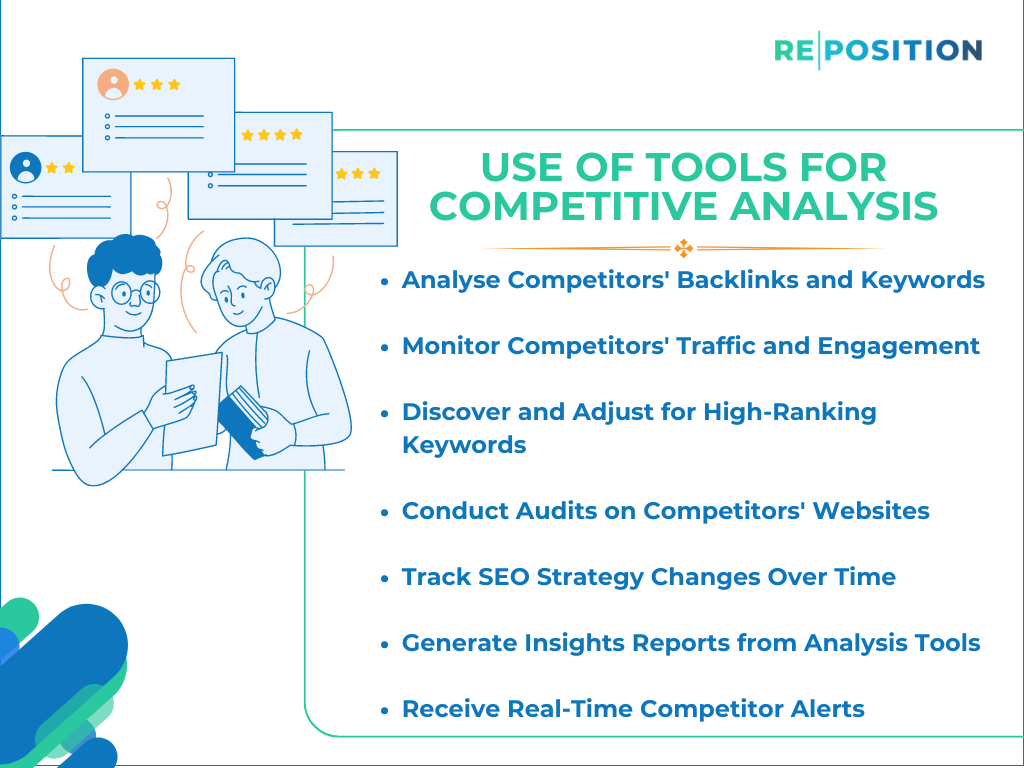
If you’ve ever wondered how to keep an edge over your competitors, you’re not alone. Many businesses constantly look for ways to stay ahead, and one of the best methods is by using competitive analysis tools.
These tools give you the insights needed to outshine your competition by analysing their strategies and identifying opportunities for improvement.
One of the first steps in this process is to analyse competitor websites. Using comprehensive competitor analysis tools, you can dive into the specifics of what your competitors are doing right. For instance, competitor analysis software allows you to dissect various aspects of a competitor’s site, from their backlink profiles to their keyword strategies. This can be particularly helpful if you’re looking to find competitors who are outranking you in search results.
For those who are budget-conscious, there are also competitor analysis tools free of charge. These tools provide essential features to kickstart your competitive analysis without breaking the bank.
They help you conduct competitor keyword research and use a competitor keyword analysis tool to understand which keywords are driving traffic to competitors’ websites. This is crucial for refining your keyword strategy and improving your competitive SEO rank.
Finding the right competitor research tools can also assist in competitor search, helping you locate and analyse competitors who are performing well in your niche. Competitor finder tools simplify this process, making it easier to identify competitors’ websites that you should be monitoring.
Once identified, competitor website analytics tools can offer deeper insights into their performance metrics, such as traffic volumes and user engagement.
When you need a detailed examination, tools like competitor website audit and website competitor analysis tools are invaluable. These tools provide a thorough analysis of competitors’ websites, highlighting strengths and weaknesses.
This kind of in-depth competitor website analysis can reveal crucial data, such as loading speeds, technical SEO issues, and user experience factors, which you can use to enhance your site.
Online competitor analysis doesn’t stop at just understanding your competitors’ current status. SEO competitor research and SEO competitor analysis tools allow you to track changes and trends over time.
Tools like SEO competitors’ tracker tools and SEO competitors’ tracking tools are perfect for ongoing monitoring. They help you keep tabs on competitors’ strategies, ensuring that you are always a step ahead.
Moreover, keyword competitor analysis is a critical part of competitive analysis. Tools designed for keyword search competition enable you to see which keywords your competitors are ranking for and how you stack up against them.
By using these tools, you can adjust your content strategy to target high-value keywords that you may have overlooked.
For instance, let’s say you’re a small business trying to compete with larger companies. Using SEO competition tools, you can perform a technical SEO analysis on your competitors’ websites.
This includes analysing their website structure, loading times, and on-page SEO elements. Tools like a website analyser or a free website SEO analysis tool can offer insights into areas where you can improve your own site’s performance.
Once you have gathered all this data, a comprehensive SEO competitor analysis report can be generated. This report consolidates all the findings from various competitor analysis tools and provides actionable insights.
You can use this information to enhance your SEO competitor research, focusing on strategies that will give you a competitive edge.
Keeping up with competitors requires constant vigilance. SEO competitor tracking ensures that you are always aware of your competitor’s moves.
Tools like SEO competitor tracking tools provide real-time updates and alerts, helping you to react swiftly to any changes.
If you’re new to this, starting with a simple website competitor analysis tool can be very beneficial. These tools guide you through the process of competitor website research, offering step-by-step instructions to analyse your website and competitors effectively.
They help you find competitors who are doing well and understand why they are successful.
Mastering the use of competitive analysis tools is essential for any business looking to thrive online. By making use of tools for competitor analysis, keyword research, and website performance, you can gain valuable insights into your competition.
This knowledge enables you to refine your SEO strategies, improve your rankings, and ultimately achieve greater online success.
Use of Tools for Backlinks Analysis
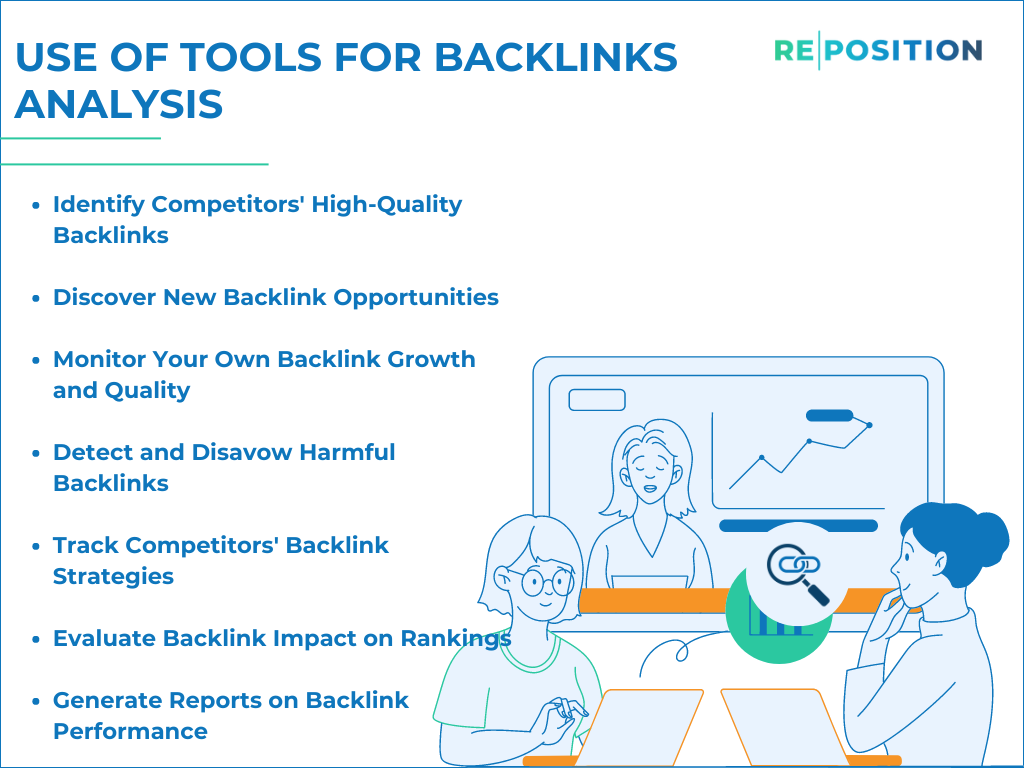
When you’re diving into the world of SEO, understanding and managing your backlinks is a game-changer. Backlinks are like endorsements from other sites, telling search engines your content is valuable. To get the best out of your SEO efforts, you need reliable tools to keep track of these backlinks. Here’s how you can use various backlinks analysis tools to boost your site’s performance.
First off, let’s talk about the backlinks checker. This tool is your go-to for getting a quick overview of who’s linking to your site. By using a backlinks checker, you can check backlinks for websites and see a list of all the websites linking to you. This is crucial for understanding your backlink profile and making informed SEO decisions.
Now, if you’re looking for the best in class, the best backlink checker is what you need. This tool doesn’t just list your backlinks; it gives detailed insights into the quality of these links. You can easily check the backlinks of a website to identify which links are boosting your SEO and which ones might be dragging you down.
For those just starting out or on a budget, there are plenty of free backlink checker tools available. These tools allow you to find backlinks free, making it easy to start building your backlink profile without spending a dime. A free backlink checker can help you check backlinks to your site, offering a solid starting point for your SEO journey.
Have you ever wondered how to check backlinks on the website? It’s simpler than you think. Tools like link checker for website and site link checker make it easy to see who’s linking to you. By regularly using a website backlink checker, you can ensure your backlinks are all top-notch.
If you’re serious about your SEO, you need to check the backlinks of a website regularly. This means using tools to check site backlinks and verify backlinks to ensure they’re helping, not hurting your SEO efforts. Tools like SEO backlink checker and website backlink checker provide detailed reports, making it easy to monitor your backlink profile.
But what if you need to check inbound links to the website? That’s where an inbound link checker comes in handy. This tool helps you check incoming links to your website, giving you a clear picture of how external sites are linking to yours. It’s crucial for maintaining a healthy backlink profile.
Sometimes, you need more detailed data. That’s where tools like Link Explorer and Link Finder come into play. These tools help you search backlinks and find backlinks to a site, offering a deeper dive into your backlink profile. They’re essential for advanced SEO strategies.
For ongoing maintenance, a free website backlinks checker can be a lifesaver. This tool helps you keep track of all your backlinks, ensuring they remain beneficial to your SEO. Regularly using a free inbound link checker ensures you’re always on top of your backlink game.
Lastly, don’t forget to check the website inbound links and check the website backlink status. Regular checks with tools like Check My Backlinks and Check Your Backlinks are vital. They help you find backlinks and verify their quality, ensuring your site remains in good standing with search engines.
By integrating these tools into your SEO strategy, you can effectively manage your backlinks and boost your site’s performance. Whether you’re just starting out or looking to refine your existing strategy, these tools are indispensable for any serious SEO practitioner.
Use of Tools to check Google Algorithms Updates
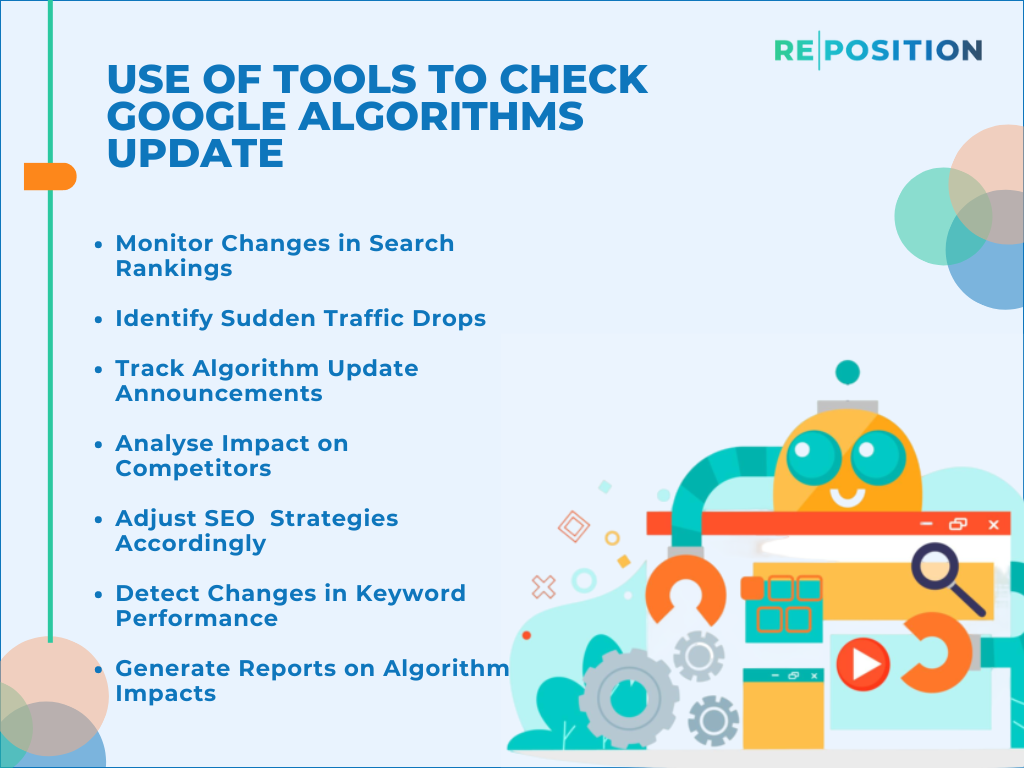
Staying in sync with Google’s latest algorithm updates is crucial for anyone serious about their website’s SEO performance. Imagine you’re a website owner wanting to keep up with Google’s ever-changing rules—updates like the Google Panda update or the newest Google core update can shake things up! These changes affect how Google ranks websites, so understanding them, whether it’s the algorithm of Google or a specific Google search algorithm update, is key to staying ahead.
So, how do you stay on top of these updates? Tools for checking Google algorithm updates are your go-to. They help you track when a Google algorithm update occurs and what it means for your site.
Whether it’s the latest Google algorithm update or just a tweak to the Google search algorithm, these tools keep you informed and ready to adapt.
Think of it this way – with tools that monitor changes in Google’s algorithm, you can catch a Google changed algorithm early. This proactive approach helps you adjust your SEO strategy quickly, whether it is adjusting for Google’s new update or optimising for the latest Google core update.
Being on the ball with tools that track Google updates today ensures your site stays resilient and competitive.
In short, mastering tools to check Google algorithm updates isn’t just about staying current—it’s about staying ahead. By using these tools to monitor the algorithm for Google and understand the impact of each Google search algorithm update, you’re empowering your website to thrive amidst Google’s constantly changing algorithms.
Use of Tools For Monitoring Google Rankings
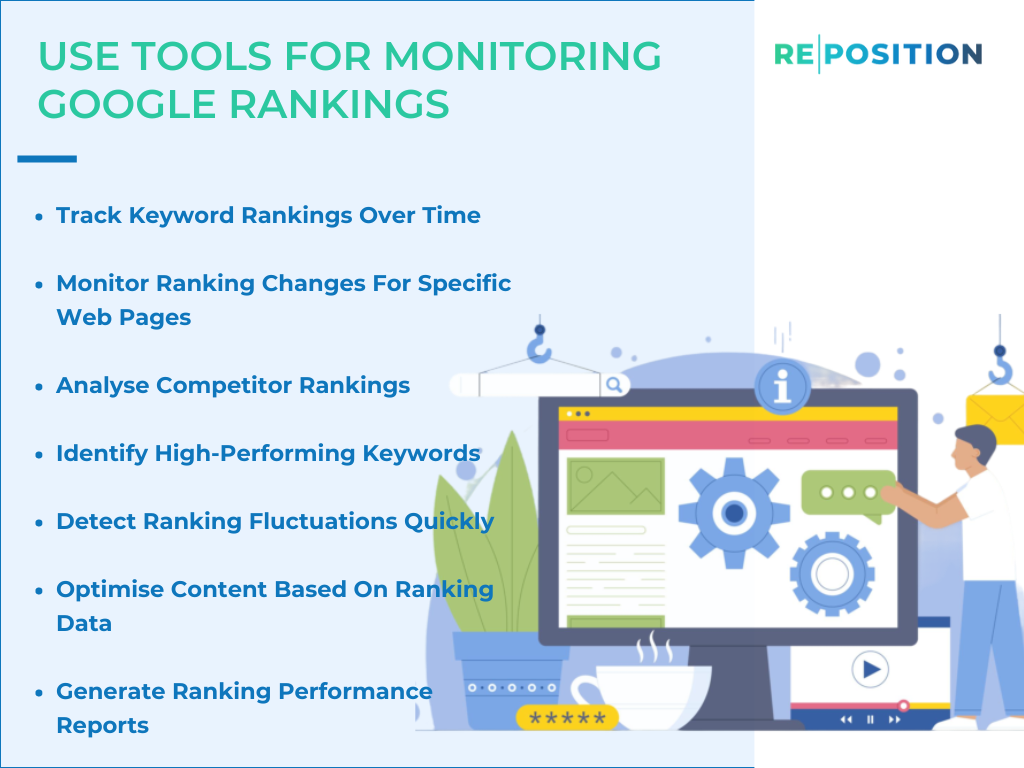
How does your website stack up on Google? It’s like keeping an eye on your place in the online spotlight. Checking your Google ranking isn’t just about numbers—it’s about understanding where you stand and how to climb higher.
When you want to check your Google ranking for website performance, tools like the Google keyword rank checker or Google page rank checker become your best friends. They crunch the numbers to show you exactly where your website sits in search results for specific keywords.
For those aiming to boost local visibility, tools like the Google local rank checker are a game-changer. They let you see how your site ranks in local searches, perfect for businesses targeting customers right in their neighbourhood.
And let’s not forget about understanding Google ranking factors. These tools give you insights into what affects your ranking—whether it’s SEO strategies, content quality, or the latest Google ranking changes. Knowledge is power here, helping you tweak your approach to climb higher on Google searches.
Curious about how to check your website ranking on Google? These tools make it easy. You can track your progress, see how you fare against competitors, and get tips on how to rank higher on Google. It’s like having a GPS for your website’s journey to the top of search results.
So, whether you’re checking site position in Google or using a Google web ranking checker, these tools give you the edge. They’re not just about data—they’re about empowering you to refine your SEO strategy, improve your site’s visibility, and ultimately attract more visitors searching for what you offer.
List Of The Top 10 Tools For Monitoring Google Rankings Of Websites And Web Pages
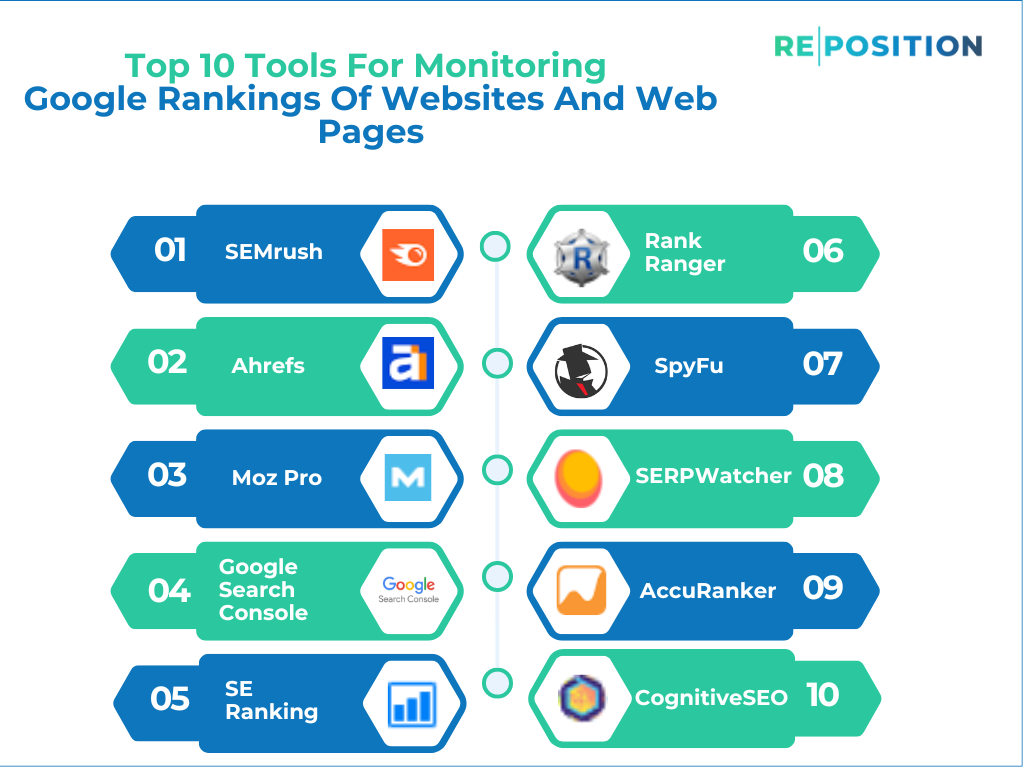
☑ SEMrush: Offers comprehensive SEO tools including rank tracking, keyword analysis, and competitor insights.
☑ Ahrefs: Known for its robust backlink analysis, Ahrefs also provides accurate rank tracking and keyword research tools.
☑ Moz Pro: Provides a suite of SEO tools including rank tracking, site audits, and keyword research.
☑ Google Search Console: Offers free tools to monitor your site’s performance in Google search results, including keyword rankings and site traffic.
☑ SE Ranking: Provides keyword position tracking, competitor analysis, and site auditing tools.
☑ Rank Ranger: Offers customisable rank tracking, local SEO monitoring, and comprehensive reporting.
☑ SpyFu: Focuses on competitor analysis, keyword tracking, and PPC research.
☑ SERPWatcher: Part of the Mangools suite, it offers easy-to-understand rank tracking with daily updates and keyword performance metrics.
☑ AccuRanker: Specialises in accurate and real-time rank tracking with advanced reporting and competitor analysis features.
☑ CognitiveSEO: Provides rank tracking, backlink analysis, and content optimisation tools for SEO professionals.
Various Google Tools for SEO
When it comes to SEO, Google offers a wide array of tools designed to enhance your website’s performance and visibility. These tools are essential for anyone aiming to understand how to get their website on Google and bring it to the top of Google search results.
One of the most crucial tools is Google Search Console. This platform allows you to monitor your website’s presence in Google search results, check site performance, identify issues, and see which queries bring users to your site.
This insight helps you figure out how to make your website appear on Google and how to get on the first page of Google. It’s also useful for learning how to get your web page on Google and how to get your site to the top of Google search results.
Google Analytics provides detailed statistics about website traffic and visitor behaviour. This data is vital for making informed SEO decisions and understanding how to get your site on top of Google search. By analysing user behaviour, you can improve your site’s performance and understand how to get your website on Google search.
For backlink analysis, Google offers a backlink checker that helps you see who is linking to your site. Backlinks from reputable sites can boost your authority and help you rank higher.
Understanding how to get your website on Google involves assessing the quality and quantity of these backlinks. You can use Google Search Console or even Google Analytics to check your website’s backlinks.

Google’s Keyword Planner is an excellent tool for keyword research. It helps you discover which search terms Google users are looking for, guiding you on how to get your website to the top of Google. Targeting the right keywords is essential for achieving high rankings and understanding how to make your website come up on Google.
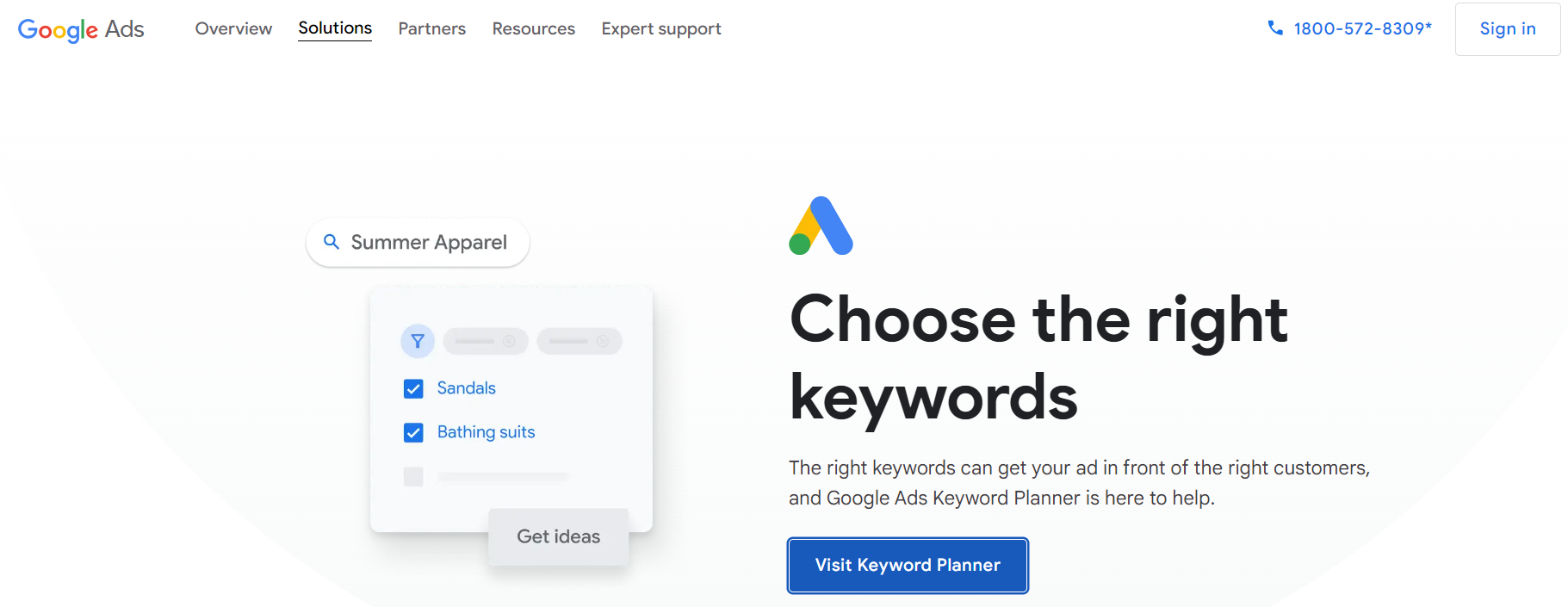
Monitoring your site’s ranking is made easier with many tools. When you type ‘Google keyword position checker’ or ’Google PR checker’, you get many tools that will provide you with rankings besides the Google search results.
These tools help to keep an eye on your rankings allowing you to adjust your strategy and stay competitive.
Google also offers tools specifically for website optimisation, such as Google PageSpeed Insights. This tool analyses your site’s performance and provides recommendations on how to improve load times, which is critical for how to get your website on top of Google searches.
Fast-loading sites tend to rank higher because they offer a better user experience.
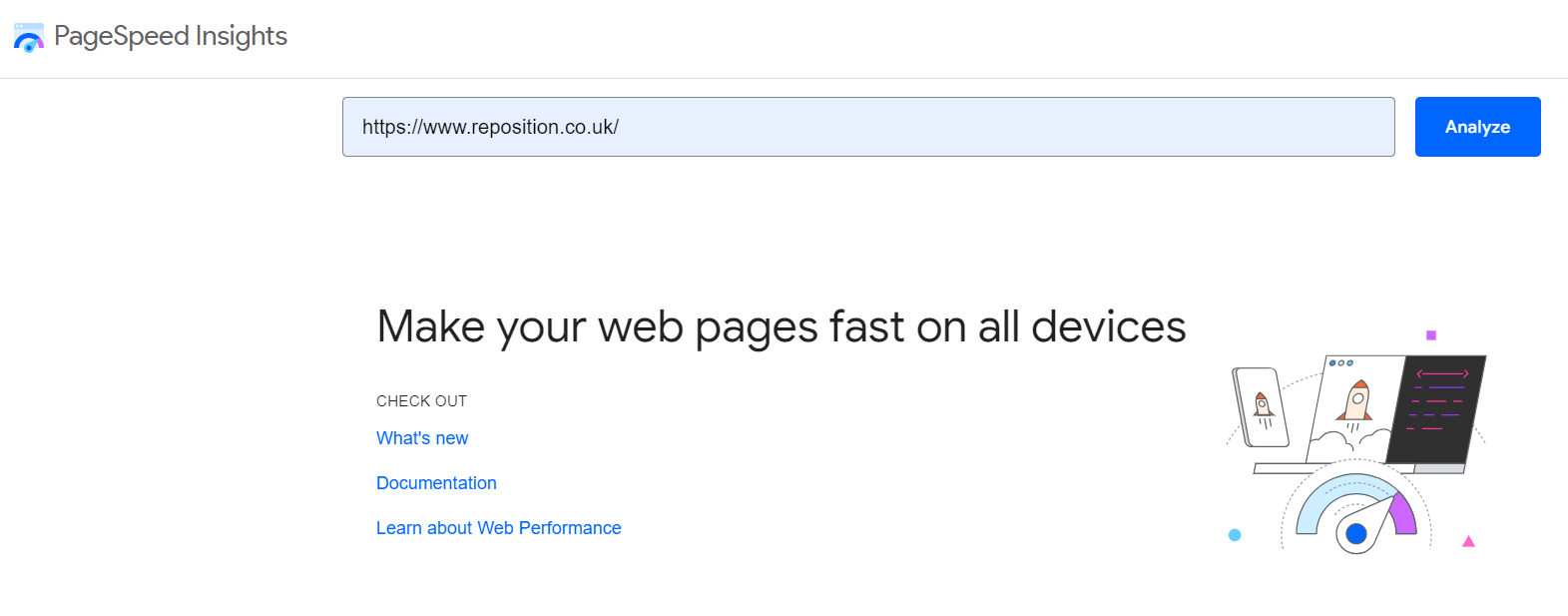
Using Google tools for search engine optimisation is crucial for staying competitive. Google SEO tools, including the Google search engine itself, help you understand how to get your website to the top of Google.
You can search Google by site to see how your pages are indexed and use Google search site to find specific content on your website. These tools help answer questions like how to bring your website to the top of Google and how to get your website to the top of Google search.
Combining these tools provides the data and insights needed for effective SEO. From figuring out how to improve website ranking with Google to how to get your site to the top of Google, these tools are indispensable.
Tools like Google Analytics and Google Search Console help you monitor performance and make necessary adjustments to improve your rankings. Additionally, knowing how to get your webpage on Google involves using tools like Google keyword position checker and Google PR checker to track your progress.
Mastering these Google tools gives you the edge in learning how to get your site to the top of Google. From tracking performance with Google Analytics to optimising your site with Google Search Console and researching keywords with Google Keyword Planner, these tools are essential for anyone serious about SEO.
So, whether you’re figuring out how to get on the first page of Google, Google’s suite of SEO tools has you covered.
Hope This Article Has helped You With Your Questions!
Mastering SEO tools means getting good at using them to make your website better. It’s about using them skillfully to enhance your website. When you dig deep into advanced tactics, you uncover what truly drives success: choosing the right keywords, understanding competitors’ strategies, and monitoring your website’s performance.
These tools act as your secret weapon, guiding you to make informed decisions that attract more visitors and boost your site’s visibility in search results.
SEO and Google are key in this journey, influencing how your website ranks and appears in search engine listings. And tools help you move well with both. Learning how to get your website to the top of Google search results involves mastering these SEO tools working on the engine optimisation keywords and employing effective keyword marketing strategies.
By conducting thorough website competitor research, you gain insights that help refine your SEO approach and stay competitive.
I hope this article has clarified how SEO tools can be effectively utilised. With these insights, you can confidently optimise your website to achieve better SEO rankings and enhance your online presence.
These tools are like your secret trick—they help you make smart choices that bring in more visitors and make your site show up higher in search results.
 Organic
Organic  Digital Advertising
Digital Advertising  Resources
Resources  Content Marketing
Content Marketing  Resources
Resources  Who We Are
Who We Are 
 Social
Social  Request a Quote
Request a Quote Pricing Guides
Pricing Guides 
 London
London












